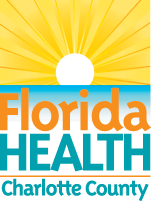It's a New Day in Public Health.
The Florida Department of Health works to protect, promote, and improve the health of all people in Florida through integrated state, county, and community efforts.
RESIDENTS ENCOURAGED TO PUT SAFETY FIRST DURING INDEPENDENCE DAY CELEBRATIONS
June 29, 2016
June 29, 2016
RESIDENTS ENCOURAGED TO PUT SAFETY FIRST DURING INDEPENDENCE DAY CELEBRATIONS
It’s Best to Leave Fireworks to the Experts
Contact:
Jennifer S. Sexton
Jennifer.Sexton@flhealth.gov
941-624-7279
Port Charlotte, Fla. – On July 4, residents and visitors gather together to celebrate this Fourth of July weekend. Fourth of July is synonymous with barbeques, parades, and fireworks displays. The Florida Department of Health in Charlotte County (DOH-Charlotte) reminds everyone to be responsible if using fireworks at their events to avoid a visit to the emergency department.
“When planning your summer celebrations, think about safety before, during and after you use fireworks,” said Mary Kay Burns, Interim Health Officer for the Florida Department of Health in Charlotte County. “Preparation can prevent tragedies from injury and fire.”
The U.S. Consumer Product Safety Commission estimates that in 2014, about 10,500 people were treated in hospital emergency rooms for injuries associated with fireworks. Sixty-seven percent of these estimated injuries occurred in a one-month special study period (June 20, 2014 – July 20, 2014) around July 4.
Want to be safe and still enjoy the festivities? DOH-Charlotte recommends enjoying a professional fireworks display conducted by seasoned professionals. Grab the picnic basket, Frisbee, sunscreen, and bug spray and head out to see the show. Injury Prevention Coordinator, Heather Boyd recommends that those who do decide to light off their own fireworks do so in, “an open area away from homes, buildings, and spectators.” Boyd adds, “Use common sense, stay safe, and only use legal fireworks.”
What Fireworks Are Legal in Florida?
The only fireworks legal for use by consumers who don't possess a special permit in Florida are those that fall into the category known as "sparklers". Those include items such as sparklers, fountains, snakes, and glow worms. Florida law prohibits the recreational use of any fireworks that fly through the air or explode, such as Roman candles, bottle rockets and mortars.
Sparklers
Every year, young children can be found along parade routes and at festivals with sparklers in hand, but they are much more dangerous than most people think. Parents don't realize they burn at approximately 1,200 to 2,000 degrees. Sparklers can quickly ignite clothing, and many children have received severe burns from dropping sparklers on their feet. Boyd suggests, “Instead of sparklers, young children can be given glow sticks. They can be just as fun.”
The National Safety Council provides these fireworks safety tips:
- Obey all local laws regarding the use of fireworks
- Read the cautionary labels and performance descriptions of fireworks before
igniting - Have a responsible adult supervise all firework activities
- Do not mix alcohol and fireworks
- Never allow young children to handle fireworks
- Older children should use them only under close adult supervision
- Anyone using fireworks or standing nearby should wear protective eyewear
- Never light them indoors
- Only use them away from people, houses and flammable material
- Only light one device at a time and maintain a safe distance after lighting
- Never ignite devices in a container
- Do not try to re-light or handle malfunctioning fireworks
- Soak unused fireworks in water for a few hours before discarding
- Keep a bucket of water and water hose nearby to fully extinguish fireworks that don't go off or in case of fire
For more safety tips and resources regarding firework safety, please visit the National
Council on Fireworks Safety’s website at fireworksafety.com.
Table 1 presents the estimated number of non-occupational, fireworks-related injuries that were treated in U.S. hospital emergency departments between 1999 and 2014.
Table 1 Estimated Fireworks-Related Injuries: 1999–2014
Year | Estimated Injuries | Injuries per 100,000 People |
2014 | 10,500 | 3.3 |
2013 | 11,400 | 3.6 |
2012 | 8,700 | 2.8 |
2011 | 9,600 | 3.1 |
2010 | 8,600 | 2.8 |
2009 | 8,800 | 2.9 |
2008 | 7,000 | 2.3 |
2007 | 9,800 | 3.3 |
2006 | 9,200 | 3.1 |
2005 | 10,800 | 3.7 |
2004 | 9,600 | 3.3 |
2003 | 9,300 | 3.2 |
2002 | 8,800 | 3.1 |
2001 | 9,500 | 3.3 |
2000 | 11,000 | 3.9 |
1999 | 8,500 | 3.1 |
Source: NEISS, U.S. Consumer Product Safety Commission. The estimate for 2003 excludes an estimated 150
emergency department-treated injuries following the nightclub fire in West Warwick, RI. Population estimates for 2010
to 2014 are from Table 1. Annual Estimates of the Resident Population for the United States, Regions, States, and
Puerto Rico: April 1, 2010 to July 1, 2014 (NST-EST2014-01), U.S. Census Bureau, Population Division. Release
Date: December 2014. Population estimates for 2000 to 2009 are from Table 1. Annual Estimates of the Resident
Population for the United States, Regions, States, and Puerto Rico: April 1, 2000 to July 1, 2009 (NST-EST2009-01).
Population Division, U.S. Census Bureau. The estimate for 1999 is available at:
http://www.census.gov/popest/data/national/totals/1990s/tables/nat-agesex.txt.
About the Florida Department of Health
The department, nationally accredited by the Public Health Accreditation Board, works to protect, promote and improve the health of all people in Florida through integrated state, county and community efforts.
The department works to protect, promote and improve the health of all people in Florida through integrated state, county and community efforts.
Follow us on Twitter at @HealthyFla and on Facebook. For more information about the Florida Department of Health please visit www.FloridaHealth.gov.





Connect with DOH